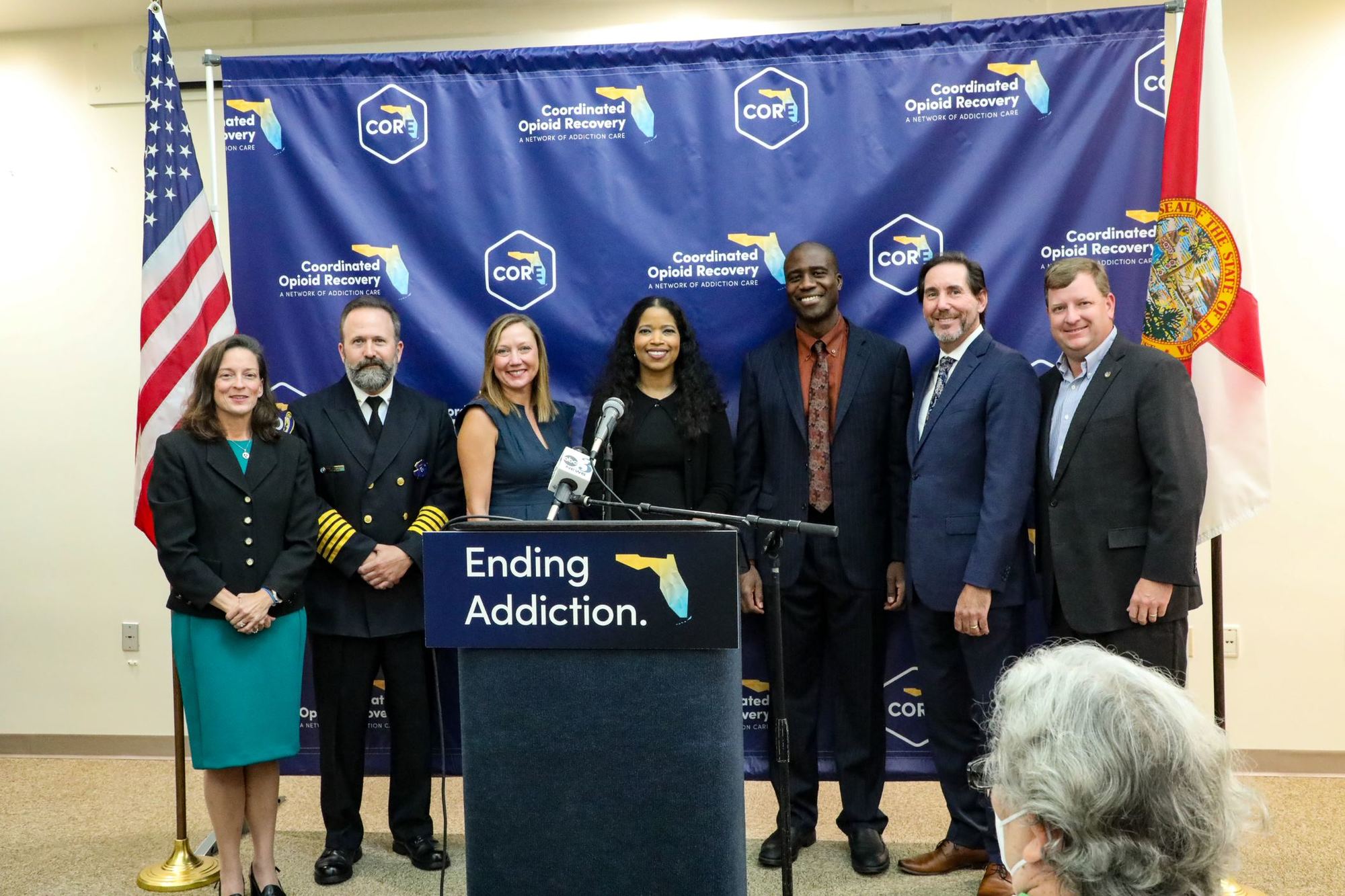It's a New Day in Public Health.
The Florida Department of Health works to protect, promote, and improve the health of all people in Florida through integrated state, county, and community efforts.
State Surgeon General and DCF Secretary Harris Visit Escambia County Core Network
September 21, 2022

Contact:
Communications Office
NewsMedia@flhealth.gov
850-245-4111
Escambia County, Fla. – Today, State Surgeon General Dr. Joseph Ladapo and Department of Children and Families Secretary Shevaun Harris, alongside community partners, visited the expansion of the Coordinated Opioid Recovery (CORE) in Escambia county - a comprehensive network of addiction and opioid treatment.
This year, Florida has experienced nearly 2,000 reported fatal overdoses. In Escambia county, Emergency Medical Services reported that in 2021, teams responded to over 1,000 overdose calls. Current data indicates Escambia County is in the top 10 counties in Florida with the highest fatal overdose rates.
The CORE Network is the first of its kind in the nation, coordinated through the Department of Health, Department of Children and Families, and the Agency for Health Care Administration. The full-scale treatment approach of the CORE Network expands every aspect of overdose response and creates an all-inclusive sustained system of care and patient navigation to wholistically address all primary and secondary impacts of substance use disorder.
“Substance abuse is heartbreaking for all involved, and we ultimately want to help people address all impacts of substance abuse,” said State Surgeon General Dr. Joseph Ladapo. “One day the standard of care will address the trauma and the stress, but until then we have the evidence-based practices that exist in place. This program is an applied, intensive application to managing addiction through powerful, effective practice that connects people to what they need to get out of the horrific cycle of addiction."
“By partnering with community providers, and other state agencies we are able to better leverage resources so that individuals contending with a substance use disorder have access to the right array of services that will work for their individual needs,” said Department of Children and Families Secretary Shevaun Harris. “As we continue to see growth in the CORE program, we know that the additional supports available through this model will help us address needs wholistically instead of in a siloed approach.”
Substance abuse is a chronic multifaceted life-threatening disease. If an individual in Escambia county overdoses, specialized emergency medical services protocol will begin stabilization while transporting the patient to a specialty hospital with attained specialty expertise in addiction medicine. Once all emergent health threats are stabilized, the patient’s long term care needs will then be transferred to an expert multi-specialty outpatient practice to support sustainable recovery.
CORE provides a personalized treatment umbrella ranging from primary care to mental health support. By facilitating these connections in Escambia county, CORE disrupts the revolving door of addiction by connecting overdoses to sustainable care, in real time.
“The existing standard of care for substance use disorder is outdated. The current overdose response in most of the United States treats the acute overdose, without providing access to sustainable care,” said Dr. Kenneth Scheppke, Deputy Secretary for Health. “That’s exactly why we’ve developed CORE. This program facilitates the necessary connections among local emergency response and specialty health care networks to not only respond to an acute overdose, but to connect individuals suffering from substance use disorder to sustainable and long-term care."
If you, or someone you know, is struggling with substance use disorder and would like more information on CORE in Escambia County, you may contact Community Health Northwest Florida at 850-436-4630 or the Escambia County Health Department.
If you suspect an overdose, call 911 immediately. The State has deployed resources that can be posted in public areas to ensure Floridians remain vigilant of the signs of overdose, how to respond, and where resources are available.
About the CORE Network
CORE was successfully piloted in Palm Beach County for nearly two years and will be expanding in up to twelve additional counties to help patients break free from the deadly cycle of overdose. Floridians battling with addiction can utilize CORE for stabilization and to receive medication assisted treatment from a network of specialized medical experts that will help guide them on a sustained pathway to healthy success. CORE will be expanded in two phases. Phase one counties include Brevard, Clay, Escambia, Gulf, Marion, Pasco, and Volusia counties. Phase two counties include Citrus, Duval, Flagler, Manatee, and Pinellas.
Florida is proud of its efforts in fighting the opioid epidemic and continues do so with access, evidence-based care, and lifelong comprehensive treatment. Floridians can find more information about CORE and various recovery resources here.
About the Florida Department of Health
The department, nationally accredited by the Public Health Accreditation Board, works to protect, promote and improve the health of all people in Florida through integrated state, county and community efforts.
Follow us on Twitter at @HealthyFla and on Facebook. For more information about the Florida Department of Health please visit www.FloridaHealth.gov.
Subscribe To Email List



Connect with DOH